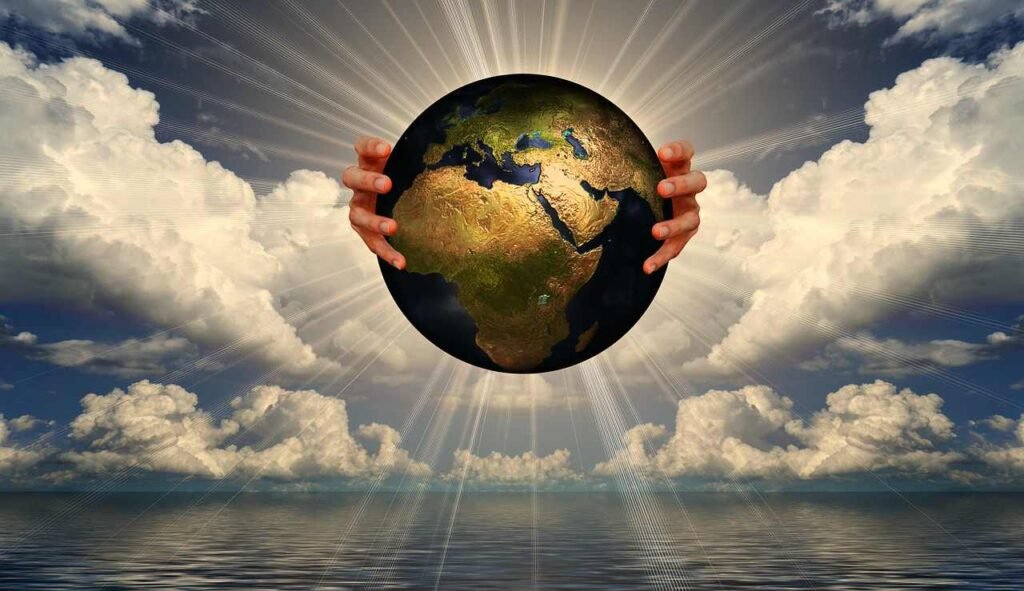
For a growing number of people, the answer seems to be yes. But is that the Right Answer?
For centuries, spirituality has been an integral part of human life, providing a source of hope, comfort, and connection. As the world has become increasingly secularized, many people have begun to question the relevance of spiritual belief in our lives. Can we truly survive without spirituality in today’s world? In this article, we will explore the potential implications of a world without spirituality and discuss how spiritual principles can provide guidance for living with integrity and purpose. We will also consider how spirituality can help us to foster deep connections with others and find meaning in our lives.
1- The Importance of Spirituality in Today’s World
There is no doubt that spirituality is important in today’s world. Without it, the world may become a more
materialistic and individualistic place, with a focus on accumulating wealth and achieving personal success
at any cost. The absence of spiritual values such as compassion, empathy, and connectedness could lead to
increased division, conflict, and isolation among individuals and communities. Spirituality can provide a
sense of purpose and meaning, as well as a framework for ethical decision-making and social responsibility.
Without these guiding principles, the world may become a more cynical and disconnected place, with little
emphasis on the well-being of others or the planet as a whole. Whether you are religious or not, I believe
that spirituality is an important part of our lives. It can provide a sense of peace and tranquility, as well as a
framework for making ethical and moral decisions. If you are looking for ways to connect with your spirituality,
there are a variety of ways to do so. You can read religious texts, attend religious services, or practice meditation
or yoga. There is a lot of flexibility when it comes to finding spirituality, which is a welcomed change from the
traditional dogma that has been imposed on us for so long. The world could use more of the spirituality that
exists in today’s world, and I hope that more people will begin to explore its benefits.
2- The Role of Spiritual Values in Ethics and Decision-Making
There is a growing consensus among scientists that spirituality is an important part of human life.
Many people believe that without spiritual values such as compassion, empathy, and connectedness, the world
may become a more materialistic andindividualistic place, with a focus on accumulating wealth and achieving
personal success at any cost. Spirituality can provide a sense of purpose and meaning, as well as a framework
for ethical decision-making and social responsibility. Without these guiding principles, the world may become
a more cynical and disconnected place, with little emphasis on the well-being of others or the planet as a whole.
It is important for individuals to have a sense of spirituality in order to make ethical and responsible decisions,
and to have a deeper understanding of the interconnectedness of all things. In order to thrive in today’s world,
it is important to have a spiritual foundation.
3- The Connection Between Spirituality and Meaning in Life
The purpose of spirituality is to provide a sense of meaning and purpose in life. Too often, however, the world
is becoming more materialistic andindividualistic, with a focus on accumulating wealth and achieving personal
success at any cost. This lack of spiritual values such as compassion, empathy, and connectedness could lead
to increased division, conflict, and isolation among individuals and communities. Spirituality can provide a
sense of purpose and meaning, as well as a framework for ethical decision-making and social responsibility.
Without these guiding principles, the world may become a more cynical and disconnected place, with little
emphasis on the well-being of others or the planet as a whole. Although spirituality is on the decline in today’s
world, there is a growing connection between spirituality and meaning in life. As society becomes
more and more individualistic, people are looking for ways to connect with one another and find meaning
in their lives. This connection can be found in different forms, such as through prayer, meditation, worship,
and nature appreciation. If we want to continue to have a thriving and spiritually-fulfilled world, we need
to continue to explore and find ways to connect with one another.
4- The Effects of Spirituality on Mental Health and Well-being
Spirituality has been shown to have positive effects on mental health and well-being. There is evidence to
suggest that people who have a spiritual practice are less likely to suffer from mental health problems such
as depression, anxiety, and addiction. They also have a better sense of self-worth and are more likely to feel
positive emotions such as happiness and love. Spirituality also appears to be protective against mental
health problems. People who have a strong spiritual practice are less likely to experience episodes of
depression, anxiety, and addiction. They are also more likely to report having a positive sense of self-worth
and feel positive emotions such as happiness and love. Spirituality has the potential to help us make better
ethical decisions and to connect us with others. It can provide a sense of purpose and meaning in our
lives and a framework for social responsibility. Without spirituality, the world may become a more
materialistic and individualistic place, with a focus on accumulating wealth and achieving personal
success at any cost. Spirituality is an important part of our lives and has a range of positive effects on
mental health and well-being. It has the potential to help us make better ethical decisions, connect us
with others, and provide a sense of purpose and meaning in our lives.
5- Spirituality and its Impact on Social Relations and Community Building
Spirituality has a profound impact on social relations and community building. It can provide a sense of
purpose and meaning, as well as a framework for ethical decision-making and social responsibility. When
people are connected to their spiritual selves, they are more likely to feel compassion for others and work
towards resolving conflicts peacefully. This is because they have a deeper understanding of themselves
and their place in the world. Is Spirituality losing it’s appeal? For a growing number of people, the answer
seems to be yes. A recent study found that almost half of Americans don’t believe in God, and another study
found that one-third of Americans say they have little or no spiritual connection. The trend is particularly
pronounced among young people, with almost half of millennials reporting that they have little or no spiritual
connection. As the pace of modern life continues to accelerate and the world becomes increasingly globalized,
the role of spirituality in today’s society has come into question. In a society focused on wealth, power, and
success, is there any room for spirituality? Is it possible to survive without it? These questions are becoming
more pressing as we grapple with the moral, ethical, and ecological challenges of our times.
6- The Evolution of Religious Beliefs and Practices Through History and Across Cultures
Religious beliefs and practices have evolved over the course of human history, and this evolution has been
observed across cultures. Today, thereare many different religious beliefs and practices, each with its own
set of principles and values. While some of these beliefs and practices may be familiar to us, others may
be new to us. For example, some people believe in a god or gods, while others may believe in nothing at all.
There are also a variety of religious practices, such as praying, fasting, and participating in religious ceremonies.
Religious beliefs and practices can have a positive impact on our lives, and they can provide us with a sense
of purpose and meaning. They can also help us to make ethical decisions and to socialize responsibly.
However, without a spiritual foundation, religious beliefs and practices can also lead to conflict and isolation.
The absence of a spiritual dimension could lead to a world that is more materialistic and individualistic, with
a focus on accumulating wealth and achieving personal success at any cost. While religious beliefs and
practices may be evolving, they are still vitally important for the well-being of individuals and communities.
7- Spiritual Themes in Art, Literature and Popular Culture
Throughout history, there have been many instances where art, literature, and popular culture have reflected
spiritual themes. Some of these themes include the quest for meaning, the search for a higher power, and the
connection between humans and the divine. There are many examples of this throughout art, literature, and
popular culture. For example, in the painting The Last Supper, Jesus is portrayed as a spiritual teacher who is
offering guidance to his disciples. The painting by Leonardo da Vinci is often cited as an example of great art
that deals with spiritual themes. In The Catcher in the Rye, Holden Caulfield reflects on his own spiritual journey,
and the importance of connecting to a higher power. Similarly, popular movies and TV shows such as The Lord
of the Rings, Harry Potter, and Game of Thrones often feature spiritual elements. These series often explore the
power of good and evil, the importance of sacrifice, and the quest for justice. Spirituality is an important part of
the human experience, and it is important that we continue to reflect on these themes in art, literature, and
popular culture. By doing so, we can help to provide a sense of purpose and meaning in an increasingly
materialistic world, as well as a framework for ethical decision-making and social responsibility.
8- Spirituality in Education and the Workplace
In today’s world, spirituality is becoming more and more important. With the rise of various forms of spirituality,
such as mindfulness, yoga, and meditation, there is a growing interest in incorporating spiritual values into our
education and workplace.While some people may argue that spirituality is not necessary in today’s world, there
are many compelling reasons why it is important to include spirituality in our lives. Furthermore, spirituality can
be beneficial in our educational experiences. It can help us to develop a deeper understanding of ourselves and
our surroundings. It can also help us to connect with others on a deeper level, leading to a stronger communal
bond. Spirituality is an important component of today’s world. It can provide us with a sense of fulfillment and
purpose, as well as a framework for ethical decision-making and social responsibility. Employers should be
aware of the benefits of spirituality in the workplace, and should encourage their employees to incorporate
spirituality into their lives.
Conclusion
In conclusion, spirituality plays a crucial role in our lives and in the world as a whole. It offers us a sense of connectedness to something greater than ourselves, and helps us find meaning and purpose in our lives. Without it, we risk becoming disconnected, materialistic and self-focused individuals that lack empathy and compassion for others. It’s essential that we make spirituality a priority, practicing it in our daily lives and seeking ways to connect with others who share our values. So, let us take the necessary steps to incorporate spirituality into our lives and make the world a better place for everyone. Will you take this journey towards a more connected, compassionate and fulfilling world? Hopefully your answer is yes.
As Albert Einstein once said, “The most beautiful thing we can experience is the mysterious. It is the source of all true art and all science. He to whom this emotion is a stranger, who can no longer pause to wonder and stand rapt in awe, is as good as dead: his eyes are closed.” This quote emphasizes the importance of spirituality and connecting with something greater than ourselves, as it opens our minds to the wonders of the world and allows us to find meaning and purpose in our lives.









